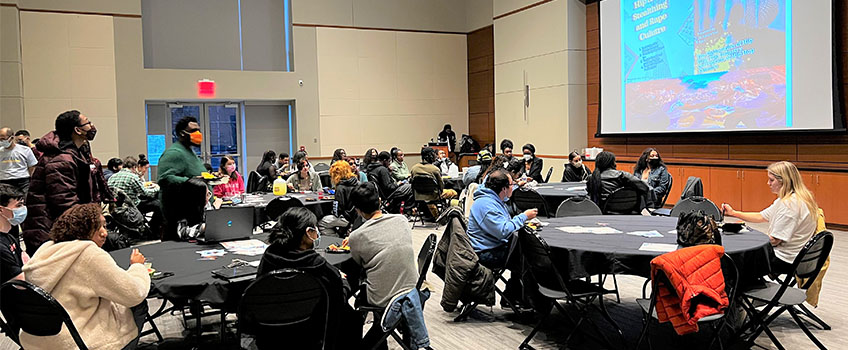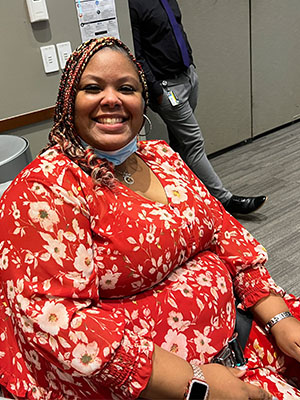WGSC Reaches More Women of Color With New Programming

The 'Hip-Hop: Stealthing and Rape Culture' program this semester used music to engage students in serious conversations about power-based personal violence.
Galloway, N.J. - Stockton University’s Women’s Gender and Sexuality Center (WGSC) is broadening its programming for people of color and finding creative ways to connect with and educate students on interpersonal violence.
The Women’s, Gender and Sexuality Center (WGSC) received a $100,000+ GEER II Grant from the State of New Jersey in October to support this initiative, which Laurie Dutton, director of the WGSC, breaks down into three goals:
- Strengthen the WGSC’s Victim Advocacy Center by establishing a peer education program to increase awareness of the center and prevention education.
- Increase reporting of interpersonal violence among students of color by 25%.
- Provide peer-led awareness campaigns on interpersonal violence.
 Since then, the WGSC welcomed Tierra Houston as program coordinator to help meet these
goals by developing student programming. As a student majoring in Psychology and Criminal
Justice, Houston has a connection with her peers who come into the center.
Since then, the WGSC welcomed Tierra Houston as program coordinator to help meet these
goals by developing student programming. As a student majoring in Psychology and Criminal
Justice, Houston has a connection with her peers who come into the center.
Houston was inspired to begin training to become an Osprey Advocate after an incident in the WGSC. “There was a young student who needed our help, but she wanted to talk to someone who looked like her,” Houston said. “She specifically asked for me, but I couldn’t since I wasn’t an ‘advocate’ yet. She was eventually able to talk to my colleague, but that made me think about what I should do next.” Osprey Advocates are volunteers trained to respond to sexual assault, domestic violence, dating violence and stalking cases involving Stockton students.
Through the GEER Grant, Houston will be coordinating 12 dinners/discussions geared toward students of color over the next two years. One popular dinner, called “Hip-Hop: Stealthing and Rape Culture” delved into the history of hip-hop music and how some lyrics perpetuate rape culture.
“Such serious topics like power-based personal violence (PBPV) are hard to talk about. This combined with some cultures having a ‘what happens at home, stays at home’ mentality makes it even harder,” Houston said.
“A night of listening to some music made it a lot easier because we weren’t making the students feel like we were talking about them or their personal lives. Instead, I tried to give them as much information as possible. If at least one piece of information makes them go, ‘I may have experienced that before’ or ‘That’s happened to me, and I know now that’s not right,’ then I have done my job.”
If there’s anything I want students to know, it’s that you’re not alone. The WGSC is for everybody, and everybody deserves to feel safe and valued.Tierra Houston
“I felt like this program was different. The WGSC doesn’t host many events that have Black people at the center of their discussions,” Mensah said. “It was nice to see an event focused on uplifting our community. [For future events], I would like to see more topics focused on issues that the queer POC community faces.”
Houston said she will continue to educate students about power-based personal violence and encourage students, especially students of color, to report instances of violence to her and her colleagues in the WGSC.
While PBPV isn't discriminatory, it has been found to occur at higher rates in Black, Indigenous, people of color (BIPOC), and LGBTQ communities. According to Dutton, this is not a unique phenomenon, but rather a pattern.
“Historically, rates of interpersonal violence and victimization are higher among Black women (29.1%) than among White women (25%). Furthermore, the rate of lifetime victimization among Asian and Pacific Islander women is estimated to be 40-60%, and one survey found it to be as high as 80%. Latino women (7.9%) are more likely to have been sexually assaulted than non-Latino women (5.7%),” Dutton said. “According to the National Resource Center on Domestic Violence, ‘African American females experience intimate partner violence at a rate 35% higher than that of white females, and about 2.5 times the rate of women of other races. However, they are less likely than white women to use social services, battered women’s programs, or go to the hospital because of domestic violence.”
Houston added, “We know that violence is happening, but students aren’t reporting it. PBPV looks different in different communities; it’s important that our programming reaches everybody. If there’s anything I want students to know, it’s that you’re not alone. The WGSC is for everybody, and everybody deserves to feel safe and valued.”
The WGSC will host “Healing Out Loud from Abuse and Sexual Violence” at 5 p.m., April 19, in the Galloway Campus Center Theatre. The event, the third and final one of the semester, will include a buffet dinner and a spoken word performance from artist Jungle Flower. Interested students can register through OspreyHub. More programs through Houston and the WGSC will happen next Fall and Spring.
Learn more about the GEER II grant.
Story by Loukaia Taylor


